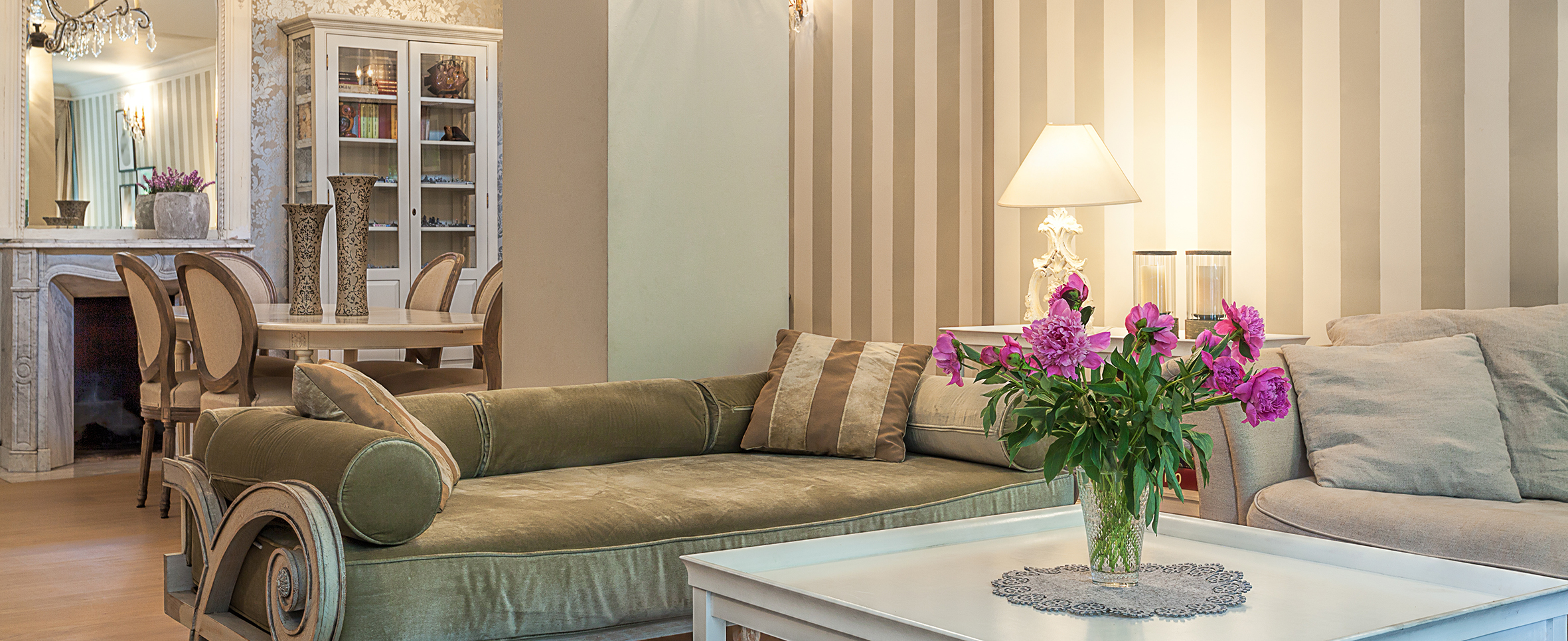Traditional, timeless and statement making, stripes are a classic heritage pattern commonly used in interior design thanks to their versatility. But for those with more minimal taste, their boldness can sometimes be off putting and considered advice can come in handy.
To explain the best way of making use of stripes in the home, Sue Jones, luxury interiors expert and co-founder of OKA, has shared her top five tips for creating a cohesive look.
- Make a small space feel bigger
Image credit, OKA
Making the most of small spaces can be challenging, and stripes offer a great option to help make an undersized room feel bigger.
Jones says: “Used in combination with mirrors, stripes can help to create the illusion of a larger space. The pattern naturally draws the eye, and gives the impression of an object or room appearing taller, wider or longer.
“If you want a room with low ceilings to feel taller, use vertical stripes, while horizontal ones are best for making a narrow room appear wider. The rule of thumb here is to make sure the stripes are facing in the direction you want to enhance.”
- Choose stripes that won’t date
While stripes are a timeless pattern, you need to pay careful consideration to the types of stripes, and the colours you use to make sure they age well.
Jones explains: “If you’re looking to create a classic aesthetic that won’t date, make sure you stick to either muted, neutral palettes or traditional bold colours, like reds, greens, whites and blues. These colours have stood the test of time and will remain stylish.
“You should also avoid introducing stripes with too many colours, which can clash and make the aesthetic appear chaotic. Instead, limit yourself to no more than three colours of stripes; a main colour, and two supporting colours, or alternatively a classic two tone, which will never go out of fashion.
“The type of stripe also plays a role, and you’ll need to choose between a thick or thin striped pattern. Thick stripes are great for a bold aesthetic, and work especially well in two tone colours. Thin stripes meanwhile, work well for a more understated look, and work equally well with brighter colours, or more muted tones.”
- Make a statement with bold furnishings
Image credit, OKA
Choosing to be bold with pattern can be daunting, but embracing a loud, statement piece can create a striking focal point that brings your room to life. If you prefer to keep your walls on the plainer side, then choosing striped furniture is the perfect choice.
Jones comments: “Since being introduced, some of OKA’s best selling striped products have been larger, statement pieces of furniture like armchairs and luxury sofas, demonstrating the popularity of introducing bold, striped focal points.
“Patterned upholstery is not just for the brave. Whether you’re adding a new custom sofa or a smaller armchair, opting for stripes is an eternally safechoice. If you’re concerned about going too bold, you can always opt for a more neutral piece with muted colours and stripes that are less defined.”
- Bring life to a neutral palette
If you tend to play it safe with your interior aesthetic and have chosen a more neutral colour palette, stripes are a perfect option for jazzing it up a little.
Jones shares: “Neutral spaces are by no means a bad thing, but sometimes you may decide that you want to refresh the aesthetic, or add something new to the room that adds a little more vibrancy. For this purpose, stripes work very well.
“Consider adding smaller statement pieces, such as stools and side tables, or fabrics such as luxury cushion covers, throws and rugs. An even more subtle option is to opt for accessories with stripes, such as a quintessentially British striped china set.”
- Don’t let stripes take over
As versatile as stripes are, you should avoid overdoing them in a single space. Be selective in where you use stripes and make sure you’re not letting the pattern carry over from the walls to multiple pieces of furniture.
Jones reveals: “A good rule of thumb is to incorporate patterns on either walls or furniture. If you’re introducing a striped armchair or sofa, then you should consider avoiding striped wallpaper so as not to overdo the design. If you’ve opted for striped walls, then you should limit further use of stripes to smaller accessories, such as cushions and other fabrics.
“You should also aim to be consistent with your choice of stripes. Consider sticking to either horizontal or vertical stripes, and avoid combining the two. You should also choose a single colour palette for stripes to avoid creating a jarring aesthetic.”
For more information about how to decorate with stripes, visit: https://www.oka.com/uk/ideas/advice/decorate-with-stripes





